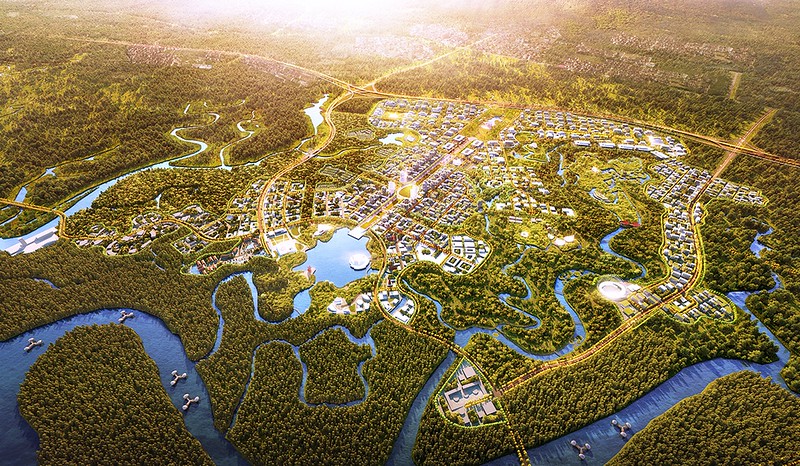Indonesia‘s proposed new capital named Nusantara in East Kalimantan on the island of Borneo.
In the first half of 2024, Indonesia’s investment landscape made a notable leap forward. The Ministry of Investment reports that the nation attracted approximately 829 trillion rupiah (around US$53 billion) in combined foreign and domestic capital from January to June, representing a substantial 22.3% increase compared to the same timeframe last year. This volume already accounts for over half of the government’s annual target of 1,650 trillion rupiah (US$103 billion).
More than half of these funds originated from foreign investors, reflecting a strong global interest in Indonesia’s markets. Similar to 2023, the downstream metals segment, particularly nickel-related industries, remained a key magnet for investment. Indonesia aims to leverage its vast mineral deposits to foster advanced processing industries and to strengthen its position in the global supply chain, especially for electric vehicle (EV) components. With some of the world’s largest nickel reserves, the country plans to expand EV battery production and secure a top-three global ranking in that field by 2027.
Primary Sources of Foreign Investment (January–June 2024)
Leading contributors included Singapore (US$8.8 billion), China (US$3.9 billion), Hong Kong (US$3.8 billion), and the United States (US$2.4 billion). Other major investors were Japan, South Korea, Malaysia, the Netherlands, the British Virgin Islands, and the United Kingdom.
Key Sectors Driving Growth
- Basic Metals: Domestic and international players invested around 122 trillion rupiah (US$7.8 billion) in this category, helping Indonesia shift from raw material exports toward more sophisticated processing and manufacturing.
- Transportation and Telecommunications: Investments reached roughly 89.2 trillion rupiah (US$5.7 billion). Indonesia’s massive telecommunications market, with over 355 million phone subscriptions and a large 4G user base, is positioned to continue modernizing its digital networks. The transportation sector is expanding infrastructure through projects like the Trans-Sumatra Toll Road and new rail lines. In fact, Indonesia recently unveiled Southeast Asia’s first high-speed railway, linking Jakarta to Bandung and significantly cutting travel times.
- Mining: Investments in mining totaled about 87.9 trillion rupiah (US$5.6 billion). Beyond nickel, Indonesia is enhancing value-added activities in its coal and gold industries. Coal gasification and DME production are planned, along with greater local refinement of gold. With abundant coal exports and the world’s largest known gold reserves at the Grasberg mine, the country is solidifying its foothold in global mineral markets.
Sustaining Investor Confidence
These robust mid-year inflows indicate rising confidence in Indonesia’s economic direction. Even so, maintaining momentum will require careful balancing of rapid growth with sustainability and responsible resource management. The government’s efforts to simplify regulations, introduce targeted incentives, and encourage more advanced industrial activities will be crucial to sustaining this positive trend and ensuring long-term, broad-based prosperity.
By Bayley Blake, Chief Marketing Officer of Mentawai One.

